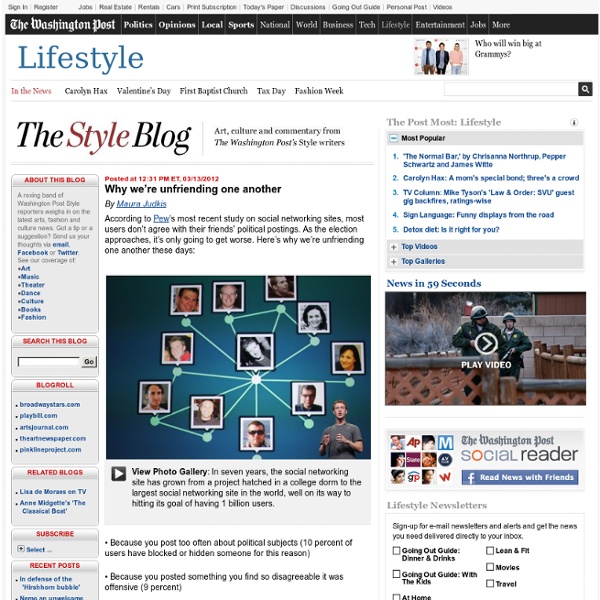Why we’re unfriending one another - The Style Blog
Posted at 12:31 PM ET, 03/13/2012 Mar 13, 2012 04:31 PM EDT TheWashingtonPost According to Pew’s most recent study on social networking sites, most users don’t agree with their friends’ political postings. • Because you post too often about political subjects (10 percent of users have blocked or hidden someone for this reason) • Because you posted something you find so disagreeable it was offensive (9 percent) • Because you argued with me about politics (8 percent — but doesn’t it take two to make an argument?) • Because you posted something that would offend my friends (5 percent) • Because I disagree with your political posts (4 percent) Users are also often surprised to learn that their friends’ political beliefs aren’t the same as theirs: 38 percent of respondents in the survey said that they discovered through a friend’s posts that his or her political affiliation was different than they’d assumed.
Unfriended? Five Ways to Manage Online Rejection
Your Facebook friendships have great potential to enrich your emotional life by expanding your social horizons beyond the people you would normally interact with at home or work. Unfortunately, though, just as Facebook can bring you up , it can also bring you down. The ending of a Facebook relationship rarely occurs in a mutually agreed-upon way. Someone decides it’s time to call the friendship off, unfriends you, and that’s it. Depending on your closeness to the other person, you may not even realize you’ve been a victim of unfriending until it dawns on you that you’re no longer seeing this person’s posts on your news feed. When you search for the person, you’re greeted with the message “Add as friend,” if that person is even searchable, and by then your worst fears are confirmed. Facebook unfriending should actually be called “Facebook estrangement” because by unfriending you, the person has officially severed social ties with you.
How to Avoid Getting Unfriended on Facebook | Social Network
Want to stay in your friends' good graces on Facebook? A new study suggests that you should start by responding to posts on your wall. The research reveals some of the unspoken rules of Facebook — the social dos-and-don'ts that keep the site humming more or less happily. Fortunately, most of these rules are pretty simple: Respond to messages, avoid disrespecting people, and don't post photos that are going to get your friends in trouble with their bosses. "If you're trying to project yourself as very professional and you're trying to get a job and your best friend comes on your page and posts something like, 'Oh what a crazy weekend, I saw you do those five keg stands,' then your friend has hurt your reputation,'" said study researcher Erin Bryant, a doctoral candidate at Arizona State University. Facebook's rules of engagement It may seem that maintaining a bit of discretion on Facebook is a no-brainer, but in fact, it's these sorts of unspoken rules that make the social world go 'round.
Unfriending Facebook Friends - Unfriends
Social networking can help us keep in touch with our pals, but it can also complicate a friendship. One thing that can cause trouble is the act of unfriending someone on Facebook. When should you do it and what does it mean for your friendship if you do? When You've Been Unfriended If you have been unfriended by one of your close pals on Facebook, your first reaction may be anger. Has my friend taken his or her profile down? If you answered no to these questions, you and your friend may have some issues to work out. Before You Unfriend Someone Deleting someone from your friend list can create some very negative feelings. Am I just angry with this person? After You Unfriend When you delete someone on Facebook, it doesn't necessarily mean you won't see or hear from them again. Other people, however, take unfriending very personally.
Related:
Related:



